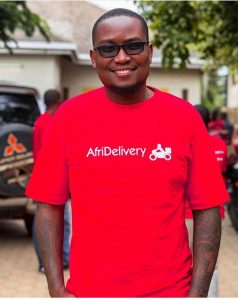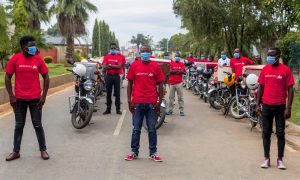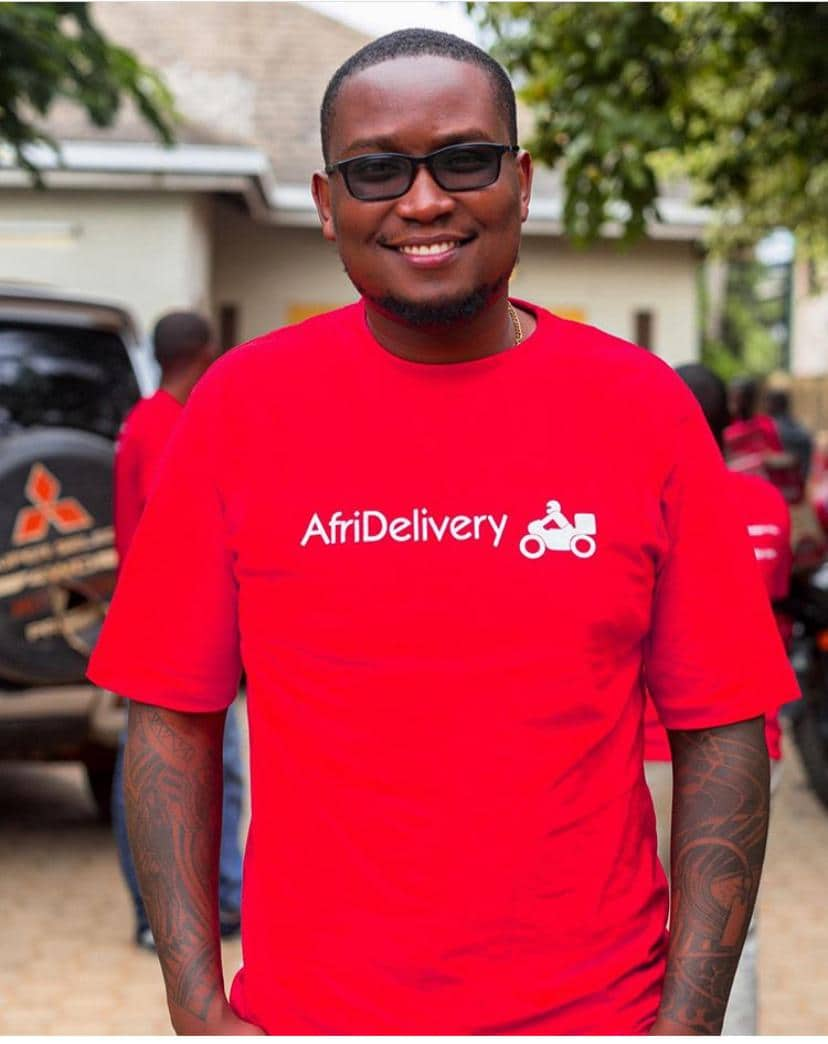Little over 5 years ago there were 3 companies operating online food delivery services. Zoom, Delivery Delish and Lunchtalk. A young man named Afshon Wallace Ngige had just arrived in the country on a one way Emirates ticket from Zimbabwe. He offered them his consultation and tech services, they said no. He went on to Debonairs who said his idea couldn’t even support just one of their stores. The next day he bought 2 bikes (for $1200) and built an application called Afridelivery. Today the app has over 200,000 daily customers and over 500 companies paying to be on the platform. Wallace, an experienced entrepreneur who has traveled around Africa starting businesses, might have actually hit the jackpot. And he has even bigger plans for 2021:
“I dont think I’ve ever felt successful until last year. To me success used to be personal, everything was focused on me. As an entrepreneur your failures can really take everything that you have and it breaks you. Now that I’m an employer, and I have the chance to give 60-70 people the opportunity to support their families, I now know you need to see what your success means for everyone in your organisation before yourself.”

The Serial Entrepreneur
Afshon Wallace Ngige was born in Nairobi, Kenya in 1989. He was raised by a single mother in a poverty stricken home. His mother had to work hard to put him through school on what little she had. As he got older his family’s fortunes changed and he gained the opportunity to go to better schools. He said this exposed him at an early age to technology and entrepreneurship giving him a new perspective, though he still couldn’t help shaking his childhood. He argues this experience gave him the hunger to always strive for success. As a teenager Ngige started attending workshops on E-Commerce, becoming obsessed with the market leader of the time E-bay. That’s when he started his first website : ‘Afshon.com’ where he would trade whatever goods he could find: “There were no online payments so it was tough, I guess I was ahead of my time” he says reminiscing on his ambition. The failure of his first business did not make him change, instead he moved to Rwanda searching for more opportunity. In 2010 he founded the first ride hailing (Uber) application in the country’s history, Afri-taxi Rwanda (originally 250 taxi). He gained almost 5,000 subscribers but never expanded as he saw Rwanda as a tester market due to its size (Rwanda has 12 million people in 26,000km² while Zambia has 20 million and 752,00km², 30 times bigger). He attempted to move his business to Zimbabwe but the economy was too difficult. Then a friend had a dream he became a huge success in Zambia. Following that chance and the laws of manifestation he chased that dream:
“In everything you do in life you must focus on being in the top 1%. With Afridelivery since we opened we have operated every single day from 07.00 to 22.00, not a single day off. We prioritize reliability over anything else and that’s why we are here now. Always give everything your best.”
Before starting his businesses Wallace was a pioneer in the African music scene. He spent years touring more than 15 different countries around Africa. When remembering this time he speaks of the important principles he developed. Before each set Mr Ngige would spend 8-10 hours practicing to make sure he was always the best performer that night. Nicknamed DJ Afshon, he established the DJ academy in Kigali and two radio stations; Radio10 (Rwanda) and SAA Radio (Swaziland). His philosophy has always been focused on incorporating God into anything he does, giving him divine motivation. Overall he ran his alternate business ventures for 8 years before finally starting Afridelivery in 2016. Shortly after leaving Zimbabwe he started the company with a personal investment of no more than $1500 (K15,000 at the time). He bought his first two bikes for $1200, rented an office in Olympia and hired his first two employees (one head of distribution and one bike driver). Today the company has 20 staff employees and over 50 drivers between the Lusaka and Kitwe offices. The majority of his workers are under the age of 30 as it inspires him to see how determined the youth of Zambia can be when given an opportunity.
Making it in Zambia
Mr Ngige believes Zambia is the perfect market for building big panafrican tech companies saying: “The people are so smart. They don’t have a problem with understanding the UX/UI, as long as you ensure the app has quality. In Rwanda people won’t even look at your app most of the time but Zambians are keen to try new things.” When he arrived he saw an opportunity in the work ethic of the Zambian founders at that time (as Kenya has more than three times the population of Zambia in a similarly sized country, the people are more competitive). Much of Mr Ngige’s life strategy has been finding an opportunity in underserved markets like Zambian e-commerce. He used this as an advantage to outplay his competitors on reliability and work ethic. When asked today about how he feels on the emergence of competitor applications he states competition is important in his business. The more people that understand and regularly use ecommerce the more that will eventually use his application. With that said his closest competitor has 10,000 downloads at best.
He is not one to pretend his business is perfect though. He left a message to address users who have been left frustrated when service capacity is reached and they can’t access the app. “We have had server issues, especially on weekends where we easily reach full capacity. The app was built purely through personal investment and we could only make improvements as we made more. We have a platform coming out this year that means we will never have those issues again”.
The company plans to leverage their logistic routes and customer base of over 200,000 customers to be open up to third party sellers and smaller businesses. In what could be considered a huge shift, the company is looking to take on an army of emerging e-commerce start-ups such as Tigule, On-Cart and GetItonline. They are entering the market with a huge partnership with Shoprite (competing in the online Grocery Market) and a lucrative deal with Lafarge (Business to business sales). During the first week of their partnership, Lafarge broke their 1 month target in a matter of days. The partnership gave him a taste for the business to business market, which pushed him to accelerate his expansion into the Copperbelt. Now their competitors have adopted a similar business model, it adds extra pressure for the company to remain innovative as the market leaders. We joked about a famous Amazon documentary where Jeff Bezos said the next Amazon will come from Africa. In the pursuit of that dream expansion Mr Ngige will be as patient as he is precise, choosing to ignore any investment offers for the time being. Afridelivery intends to expand as they always have done, organically using company profits and a carefully structured revenue model.

COVID 19 Response
Mr Ngige considers the lockdown period as a ‘bittersweet’ timing for his application. Many outsiders figured the company’s fortunes would boom as the tech stocks saw a 44% gain (including an average 42% increase in earnings) while the remainder of the market crashed. The world’s GDP declined by 4% but we witnessed a 2.4% increase in average spending on online advertising and digital services. As it became clear that tech stocks are immune to traditional restraints, Afridelivery was perfectly placed to capture the market gaining an additional 50,000 downloads during the pandemic. Some of the company’s biggest clients became dependent on the service for almost 80% of their revenue. Wallace argued that their loyal customers influenced the company’s growth more than the new however. The company leveraged customer loyalty to gain more consistent orders, as consumers’ lockdown order demands changed from once a week to 2-3 times a day. The company revenue depends on a commission from each transaction and the increase in order volume has been the biggest benefit for the company as a result.
Despite the application’s success during the pandemic Mr Ngige was very clear his company was not immune to the virus. A commitment of nearly K20,000 monthly had to go into spending on personal protective gear and sanitiser for the workforce. The drivers had to purchase more fuel and the recent shortages and price inflation have affected the companies margins. Despite the setbacks Afridelivery was one of few tech companies to contribute during the lockdown in order to mitigate the impact of COVID-19. In partnership with the ‘Feed the Heroes’ Unit of Lusaka Helps they successfully fed staff at Levy Mwanawasa hospital and labs for 6 months, delivering 4,000 meals in total. When asked about this Mr Ngige simply said, ‘there was no way he could do nothing’.
What we can learn?
For a long time Zambia has been one of the most underrated tech markets in Africa. Mr Ngige started his company with a similar size investment needed to start a mobile payments booth. Mr Ngige depends on a workforce largely made up of young Zambians to run one of the largest e-commerce companies in Zambia. What Mr Ngige has shown is that the talent is here and with the right amount of focus and dedication our market can become one of the biggest in Africa. While we often look outward at the vast innovation in Kenya and Rwanda, everyday businessmen from there are recognizing Zambia as the better market. Mr Ngige is the one of the greatest success stories in the Zambian tech market, we need more people willing to work 10 hours a day for their dream no matter how long it takes you. Last week Joe Biden became the President of America 30 years after his first attempt. Mr Ngige had to wait 13 years and suffer 8 business failures before building his success. This provides a valuable lesson most founders may have not considered in an overnight success obsessed world. Mr Ngige above everything believes in consistency, in the face of adversity patience and perseverance can help you achieve your goals. So to the entrepreneurs reading this, it doesn’t matter where you are right now, what matters is that you are putting in the work to get where you want to be.




